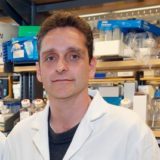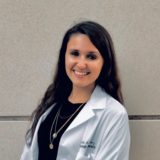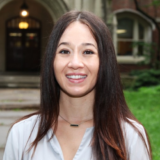![Medicine - Cancer Biology E-Newsletter [Vanderbilt University]](https://cdn.vanderbilt.edu/vu-URL/wp-content/uploads/sites/119/2017/11/19151037/cancer-biology-design-004.png)
|
|
June 2020
|
|

The recent event of the brutal and meaningless killing of George Floyd have led us all to search our hearts for evidence of racial and ethnic bias, with a desire to eliminate prejudice, both personally and within our communities, our state, and our nation. With the recognition that incredible acts of injustice continue to prevail in our country, the leadership in the Program in Cancer Biology is proactively working with our students to develop a plan going forward, we want to hear your voices. Dr. Jin Chen is reaching out to our students individually for feedback, group faculty and student meetings will be scheduled shortly. Collaboratively we can share ideas, implement them by standing up for justice and commit to working together to develop a more equitable society. We want to ensure that every person in our Program feels valued, that the unique talents they bring into the Program are applauded and appreciated, and that all students, staff, and faculty are treated equitably, regardless of race, ethnicity, or sexual orientation. While faculty and students have been working together for several years with Meharry Medical College and Tennessee State University on programs that address disparities in cancer research education as well as cancer incidence and treatment, we know we can do more. These activities can provide a step toward eliminating inequalities and creating a community free of racial and ethnic bias, but often how we go about these activities can negate the very goals we strive for—if our attitude reflects anything other than full respect and a sense of brother/sister/personhood. Ultimately, it is what is accomplished for all that provides the true mark of success in society. We stand together with the Black Community in the fight against anti-Black racism,
Jin Chen, Barbara Fingleton, Julie Rhoades, Alissa Weaver, Kim Rathmell, Chris Williams, Ann Richmond and all Faculty in the Program of Cancer Biology.
Getting to Know You…
Faculty Spotlight:
 Albert Reynolds, Ph.D. Albert Reynolds, Ph.D.
Professor of Cancer Biology,
School of Medicine
Research in the Reynolds laboratory is centered around p120-catenin (p120) and its role in cadherin-mediated cell-cell adhesion. p120 was originally identified as a substrate of Src but went in a very different direction following the discovery that it interacted directly with E-cadherin and some 20 other members if the classical cadherin superfamily. These studies culminated in the seminal finding of p120’s best-known role as an essential regulator of classical cadherin stability. Over time, the lab transitioned into conditional p120 KO mouse models to address the obvious translational implications with respect to roles for p120 in tumorigenesis and/or metastasis. Indeed, p120 has emerged as a major player in tumorigenesis and metastasis. For example, in the Apcmin mouse model of intestinal cancer, p120 functions as a potent haploinsufficient tumor suppressor, whereas p120 ablation in the MMTV-mT model of breast cancer almost entirely blocked metastasis to the lungs. Attention has recently turned to p120’s nuclear binding partner Kaiso, a transcription factor that is believed to play a central role in tissue differentiation. Remarkably, the paths of p120 and Kaiso apparently converge on a gene specific differentiation program, most likely active in a broad spectrum of epithelial tissues and possibly hijacked in cancer.
Trainee Spotlight:

Eileen Shiuan, Ph.D., was an MSTP student who recently defended her Ph.D. dissertation.
Eileen grew up in the Bay Area in California. She went to the University of Chicago, where she received a dual BS/BA degree in Biochemistry and Biological Sciences and a minor in Statistics. During those four years, Eileen realized what it meant to be cold and fleeing south to the Vanderbilt MSTP in 2013. In 2015, she joined the Cancer Biology Department and laboratory of Dr. Jin Chen, where she primarily studied host-tumor interactions involving the EphA2 receptor and ephrin-A1 ligand axis and received an F30 individual predoctoral fellowship from the NCI. She has also collaborated with clinical faculty to investigate predictive biomarkers and toxicities of immune checkpoint inhibitors. Over the years, Eileen has excelled involved in various leadership roles in the CBSA, VMS, MSTP, and Shade Tree Clinic. More recently, she has been volunteering with the COVID-19 response efforts through the medical school while preparing for her thesis defense. She is excited and anxious to be returning to medical school and applying for research-track internal medicine residencies this summer. Before quarantine, she enjoyed playing and helping coach the Vanderbilt Club Water Polo Team, hosting game nights, and exploring new restaurants with her boyfriend and friends. Now, she enjoys talking strolls and refining her pre-existing wine and mezcal habit.
Staff Spotlight:

Rebecca Shattuck-Brandt, M.Ed. Ph.D
Staff Scientist,
(Richmond Lab Manager)
Dr. Shattuck-Brandt is excited to be back in Pharmacology, where she did her post-doctoral training from 1986-1990, upon completion she joined Dr. Ann Richmond’s lab in the Department of Cell Biology, where she worked on understanding the transcriptional regulation of CXCL1 and the role of this cytokine in the pathogenesis of melanoma. In 1998 Rebecca decided to teach Chemistry and AP Biology at the University School of Nashville. Fortunate for the Richmond lab she returned to Vanderbilt five years ago and has recently published a pre-clinical paper exploring the role of MDM2 inhibitors in treating melanoma. This work also resulted in a patent on the role of KRT-232 for treating immunotherapy resistant metastatic melanoma. In her free time she enjoys attending and traveling to horse competitions with her daughter.

State cancer plan has robust input and commitment from Vanderbilt-Ingram Cancer Center
More than a dozen representatives of Vanderbilt University Medical Center helped plan and made a commitment to help carry out the strategy for how Tennessee will prevent cancer and minimize its burden on state residents.
A total of 16 physicians, researchers and educators from Vanderbilt-Ingram Cancer Center (VICC) collaborated with the Tennessee Cancer Coalition, Tennessee Department of Health and other statewide partners to create the Tennessee State Cancer Plan 2018-2022. The plan sets the framework for how Tennessee will participate in and receive funding from the National Comprehensive Cancer Control Program. The state has been a recipient of program grants since 2003.

 Margaret Axelrod, BS, received the Graduate Student of the Year award from the Vanderbilt Ingram Cancer Center. Margaret is working in the Laboratory of Justin Balko, PharmD, Ph.D. Her research project is “Clonal, Activated CD8+ T Cells Drive Immune Checkpoint Inhibitor Associated Myocarditis.” Margaret Axelrod, BS, received the Graduate Student of the Year award from the Vanderbilt Ingram Cancer Center. Margaret is working in the Laboratory of Justin Balko, PharmD, Ph.D. Her research project is “Clonal, Activated CD8+ T Cells Drive Immune Checkpoint Inhibitor Associated Myocarditis.”
 Dennis Jeppesen, Ph.D., was awarded the Postdoctoral Fellow of the year award from the Vanderbilt Ingram Cancer Center. Dennis works in the Laboratory of Robert Coffee, MD. His research project is “Reassessment of Exosome Composition.” Dennis Jeppesen, Ph.D., was awarded the Postdoctoral Fellow of the year award from the Vanderbilt Ingram Cancer Center. Dennis works in the Laboratory of Robert Coffee, MD. His research project is “Reassessment of Exosome Composition.”

Justine Sinnaeve, Ph.D., is a member of the Program in Cancer Biology who is a newly minted Ph.D. working in the Rebecca Ihrie Laboratory. Justine’s Dissertation Defense studied the “Single Cell Studies of Protein Expression Reveal Glioma Cell Phenotypes and Prognostic Tumor Populations.”
 Tolu Omokehinde, Ph.D., candidate in Rachelle Johnson Lab, received the Gilliam Scientific Outreach Program: HHMI-MNPS Volunteer Partnership award. The goal of this program is to promote diversity and inclusion at the graduate level in two ways: 1) Have a URM and non URM graduate students work as teams to engage the next generation of URM scientist.2) To demonstrate to the next generation that scientists come from different backgrounds and can work together to achieve great things. The Cancer Biology graduate students travel to Elementary schools in teams of 2-3 volunteers weekly to aid in a 1 hour STEM Classroom. Thank you teaching our next generations of scientists! Tolu Omokehinde, Ph.D., candidate in Rachelle Johnson Lab, received the Gilliam Scientific Outreach Program: HHMI-MNPS Volunteer Partnership award. The goal of this program is to promote diversity and inclusion at the graduate level in two ways: 1) Have a URM and non URM graduate students work as teams to engage the next generation of URM scientist.2) To demonstrate to the next generation that scientists come from different backgrounds and can work together to achieve great things. The Cancer Biology graduate students travel to Elementary schools in teams of 2-3 volunteers weekly to aid in a 1 hour STEM Classroom. Thank you teaching our next generations of scientists!

Rachel Brown, MSTP, received an Early Career Investigator Award from Digestive Disease Week 2020! Rachel completed two years of medical school before joining the Williams Lab and the Graduate Program in Cancer Biology. Rachel also received the Robert F. Miller Award for Community Service and Engagement by Vanderbilt University School of Medicine. Rachel was selected as a finalist due to her commitment to STEM outreach in schools, voter outreach efforts, and rehabilitating feral cats through the Pet Community Center.

Stephen J. Brandt, M.D.
Professor of Medicine, Division of Hematology/Oncology Professor of Cell and Developmental Biology.
Our research centers on the influence of altered transcription on cancer phenotype. This involves both hematologic and non-hematologic malignancy. Congratulations to Dr. Brandt on receiving the Kenneth R Hande, MD Most Outstanding Teacher Award for Excellence in Teaching Heme/Onc Fellows.
 Kimryn Rathmell MD, Ph.D., Cornelius Abernathy Craig Professor of Medicine and director of the Division of Hematology and Oncology, has been named Chair of Medicine at the Vanderbilt University School of Medicine. Our Vanderbilt community is fortunate to have innovative leaders like Dr. Rathmell. Kimryn Rathmell MD, Ph.D., Cornelius Abernathy Craig Professor of Medicine and director of the Division of Hematology and Oncology, has been named Chair of Medicine at the Vanderbilt University School of Medicine. Our Vanderbilt community is fortunate to have innovative leaders like Dr. Rathmell.
 Linda Sealy, Ph.D., Associate Dean for Diversity, Equity and Inclusion and Associate Professor of Molecular Physiology and Biophysics, is retiring effective August 15, 2020. Dr. Sealy will be appointed as Emerita Associate Professor of Molecular Physiology and Biophysics. She has co-directed the Vanderbilt Initiative to Maximize Student Diversity (IMSD) for nearly 20 years, which has dramatically increased the recruitment and training of graduate students from underrepresented backgrounds. Dr. Sealy’s mentoring expertise has allowed our Vanderbilt students to excel in the field of Science and we thank you for making a difference in our world. Linda Sealy, Ph.D., Associate Dean for Diversity, Equity and Inclusion and Associate Professor of Molecular Physiology and Biophysics, is retiring effective August 15, 2020. Dr. Sealy will be appointed as Emerita Associate Professor of Molecular Physiology and Biophysics. She has co-directed the Vanderbilt Initiative to Maximize Student Diversity (IMSD) for nearly 20 years, which has dramatically increased the recruitment and training of graduate students from underrepresented backgrounds. Dr. Sealy’s mentoring expertise has allowed our Vanderbilt students to excel in the field of Science and we thank you for making a difference in our world.

Jeffrey C Rathmell, Ph.D. FOCIS Centers of Excellence, Director of Vanderbilt Center for Immunobiology. Dr. Rathmell was interviewed about his career path, proudest achievements, involvement in FOCIS, and his research.
FOCIS Spotlight and interview
|
|
CALENDAR OF EVENTS @ VANDERBILT watch for seminars details via zoom email invitations. .
VICC Science Share Seminar Series via ZOOM
Bi monthly meetings on Thursdays at noon (CT)
Next seminar is June 18th, Alissa Weaver, M.D., Ph.D and Mariana Byndloss, DVM, Ph.D will present their research.
Quantitative Systems Seminar series of interest via ZOOM
“Disrupting Everyday Bias” workshop registration here.
VICC Virtual Division Hematology/Oncology Grand Rounds Presents:
Bill Matsui, M.D., “Translational Research in Multiple Myeloma.”
June 15th, 2020 at 12PM via Zoom
Vanderbilt Center for Immunobiology Journal Club via Zoom.
Fridays from 12PM – 1PM.

Cancer Biology Graduate Program Dissertation Defense.Laura C Kim (Chen Lab)
“Targeting mLST8 in mTORC2-Dependent Cancers.” Wednesday, June 17, 2020, 1:00PM Via Zoom
CONFERENCES:
FOCIS 2020 Annual Meeting
Marriott Marquis,San Francisco, CA
October 28-31, 2020
Register here
AACR Virtual Meeting: Covid-19 and Cancer
This meeting will focus on the presentation of emerging data in basic, clinical, and epidemiological research related to COVID-19 and cancer.
July 20-22, 2020. Register here
NIH’s Regional Seminars on Program Funding and Grants Administration will be in Nashville on October 28-30, 2020. Registration is now open. Attend this event, sponsored by the Office of Extramural Research, to learn about the application and review process, federal regulations and policies..
The Society for Immunotherapy of Cancer (SITC) has published the latest advances of immunotherapy from the 2020 American Society of Clinical Oncology Annual meeting. Read more
RECENT PUBLICATIONS OF INTEREST:
MEK inhibition activates STAT signaling to increase breast cancer immunogenicity via MHC-I expression.Derek Franklin, Jamaal James, Margaret Axelrod, Justin Balko. Cancer Drug Resist 2020;3 (online)
Host deficiency in ephrin-A1 inhibits breast cancer metastasis.
Eileen Shiuan, Ashwin Inala, et al. F1000Research 2020,9:217
Metastatic Melanoma Patient-Derived Xenografts Respond to MDM2 Inhibition as a Single Agent or in Combination With BRAF/MEK Inhibition
Rebecca Shattuck-Brandt, Sheau-Chiann Chen, Emily Murray, et al.
Clin Cancer Res. 2020 Mar 31. Online ahead of print
Single-Cell Analyses Inform Mechanisms of Myeloid-Targeted Therapies in Colon Cancer Zhang, Lei, et al. Cell. 2020 Apr 16:181 (2): 442-459
Estimation of the carrier frequency of fumarate hydratase alterations and implications for kidney cancer risk in hereditary leiomyomatosis and renal cancer Shuch B, et al. Cancer. 15 May 2020
Scott Haake, PhD at Vanderbilt University would like to share this publication and is interested in your feedback.
Hypoxia-induced epithelial to mesenchymal transition in cancer
Hapke R, Haake, S, Cancer letters available online 26 May 2020
Targeting MYCN-expressing triple-negative breast cancer with BET and MEK inhibitors. Schafer J, Lehmann B, Gonzalez-Ericsson P, et al
Science Translational Medicine. Vol12, Issue534, 11 March 2020
Th9 and Th17 Cells: The Controversial Twins in Cancer Immunity
Chi Yan, Ann Richmond. J Clin Invest, 2020 Jun 2;138418
Modulation of sulfur assimilation metabolic toxicity overcomes anemia and hemochromatosis in mice. Andrew T Hale, Rachel E Brown, et al. ELSEVIER Advances in Biological Regulation 76 (2020) 100694
The tumor micro environment as a metabolic barrier to effector T cells and immunotherapy. Lim, A, Rathmell WK, Rathmell JC. Elife. 2020 May 5.
A Live Cell Reporter of Exosome Secretion and Uptake Reveals Pathfinding Behavior of Migrating Cells.Sung, BH, Von Lersner, A, et al..
Nat Commun. 2020;11;2092
COVID NEWS:
An orally bioavailable broad-spectrum antiviral inhibits SARS-CoV-2 in human airway epithelial cell cultures and multiple coronaviruses in mice
Timothy Sheahan, Amy Sims et al. Science Translational Medicine. 29 Apr 2020: Vol 12, Issue 541
Jonathan Irish, Ph.D is excited to be part of the research team on the covid19 clinical trial launching next week at Kings College London. A new trial re-purposing a blood cancer drug for patients with covid 19 is being launched. Read more
Multinational consortium reports COVID-19 impact on cancer patients.
Yu Shyr, Ph.D, the Harold L. Moses Chair in Cancer Research and chair of the Department of Biostatistics at Vanderbilt and Brian Rini, M.D., Ingram Professor of Cancer Research and chief of Clinical Trials at Vanderbilt-Ingram Cancer Center, “This initial report defines some of the major risk factors and outcomes for certain patient subsets, and several other CCC19 projects are ongoing to further expand this knowledge with the goal to inform cancer patients and providers.”
COVID-19 Impact on Early Career Investigators: A Call for Action.
Levine R, Rathmell WK. Nat Rev Cancer. 2020 Jun 5 .
Dan Gorelick, Ph.D from Baylor College of Medicine in Houston Texas shared with us his research on the COST OF PUBLISHING PAPERS.
Cost to publish
WEBSITES OF INTEREST:
Vanderbilt Summer Science Academy
BRET Office of Career Development
Vanderbilt Hustler
Office of Postdoctoral Affairs
Tools for Grant Writing
Department of Cell and Developmental Biology
Events at Vanderbilt
VUMC Reporter News
Vanderbilt Program for Extracellular Vesicle Research
Know your CORE facilities at VUMC/VU
VICC Education, Training and Career Development

|
|
Please join us in Welcoming our graduate student trainees in the Program of Cancer Biology.
 Ebony Hargrove-Wiley, BS, Barbara Fingleton’s lab. Ebony’s research interest includes female physiology, reproductive, and immune biology. Ebony plans to study sex-specific immune responses in human samples of metastatic breast cancer in association with the Vanderbilt Cancer Biology Training Program. Also, she aims to assess the efficacy of a novel immunotherapeutic in two mouse models of metastatic breast cancer. Both models represent distinct breast cancer subtypes. This study will be performed in male and female cohorts to identify any sex influences after immunotherapy treatment. Ebony Hargrove-Wiley, BS, Barbara Fingleton’s lab. Ebony’s research interest includes female physiology, reproductive, and immune biology. Ebony plans to study sex-specific immune responses in human samples of metastatic breast cancer in association with the Vanderbilt Cancer Biology Training Program. Also, she aims to assess the efficacy of a novel immunotherapeutic in two mouse models of metastatic breast cancer. Both models represent distinct breast cancer subtypes. This study will be performed in male and female cohorts to identify any sex influences after immunotherapy treatment.

Elysa Wolf, BS, Alyssa Hasty’s lab.
Elysa’s project aims to study the role of macrophage iron-handling in the context of the tumor microenvironment. Depending on their polarization, tumor associate macrophages (TAMs) can either be pro-inflammatory and sequester iron or anti-inflammatory and recycle iron. Elysa’s goal is to explore how the supply of iron from macrophages impacts tumor cell phenotype and tumor growth.
 Amanda Hesterberg, BS, Paula Hurley’s lab, graduated from the University of Missouri with a B.S. in Biochemistry. She recently joined Dr. Paula Hurley’s lab, where she will determine how the tumor microenvironment impacts prostate cancer metastasis. Correctly, her project will center on a particular protein of interest, ASPN, which is localized to the stroma. It has been determined that increased ASPN expression is associated with more aggressive prostate cancer, yet the molecular mechanisms are unknown. Amanda will seek to determine the molecular mechanisms in which ASPN contributes to prostate cancer metastasis, which will unveil new potential therapeutic targets and improve the lives of men affected by prostate cancer. Amanda Hesterberg, BS, Paula Hurley’s lab, graduated from the University of Missouri with a B.S. in Biochemistry. She recently joined Dr. Paula Hurley’s lab, where she will determine how the tumor microenvironment impacts prostate cancer metastasis. Correctly, her project will center on a particular protein of interest, ASPN, which is localized to the stroma. It has been determined that increased ASPN expression is associated with more aggressive prostate cancer, yet the molecular mechanisms are unknown. Amanda will seek to determine the molecular mechanisms in which ASPN contributes to prostate cancer metastasis, which will unveil new potential therapeutic targets and improve the lives of men affected by prostate cancer.

Xiaopeng Sun, BS, Justin Balko’s Lab.
Xiaopeng’s project in the Balko lab aims to discover peripheral blood cell markers related to immunotherapy outcome by performing single-cell RNA sequencing on longitudinally-collected samples from a large clinical trial of chemotherapy with or without immunotherapy for early breast cancer. Signatures derived from this analysis could help guide therapeutic decision making for patients. Additionally, Xiaopeng will work on identifying target antigens of immune checkpoint inhibitor-induced toxicity. A mechanistic understanding of these immune-related adverse events will help us deploy this class of drugs to patients more safely, and potentially define therapeutic ways to reduce the risk of toxicity.”

Kara McNamara, BS, Keith Wilson’s lab.
Kara will be exploring the SMOX-driven dysregulation of polyamine metabolism and the associated generation of spermidine and hypusination and its connection to risk factors associated with gastric disease progression to carcinogenesis. Accurately, Kara will aim to analyze the role of SMOX in hypusination during H. pylori infection and determine the effect of hypusination in GECs on inflammation and carcinogenesis.

Brandie Taylor, BS, Justin Balko’s lab.
Brandie’s research focuses on triple-negative breast cancer treatment using agents that enhance the anti-tumor immune response in the tumor microenvironment. To do this, Brandie will focus on developing a molecular therapeutic that is designed to deploy immunosuppressive signals coupled with breast cancer-specific release of type-I interferon that will reverse anti-tumor immunity and lead to tumor reduction and elimination.

Brenda Rios, BS, Paula Hurley’s lab.
Brenda’s project aims to elucidate the role of Secreted protein, acidic, and rich in cysteine-like 1 (SPARCL1) in progression to metastatic prostate cancer. More specifically, Brenda will work towards understanding SPARCL1-mediated molecular mechanisms involved in restricting cell migration, determining how SPARCL1-driven ECM conformation limits tumor progression and investigating SPARCL1-induced changes in the immune cell profile of the tumor microenvironment in prostate cancer.”
EXTERNAL FUNDING OPPORTUNITIES:
Damon Runyon Cancer Research Foundation
Innovation Award. Additional Details Application deadline: July 1, 2020
National Comprehensive Cancer Network (NCCN); Eli Lilly and Company
Elucidating Biomarkers and Mechanisms of Resistance to CDK 4 and 6 inhibitors Through Preclinical, Clinical, and Real World Evidence Studies of Abemaciclib for Breast Cancers. Additional Details
Application deadline: July 10, 2020
National Comprehensive Cancer Network (NCCN); Pfizer
Pfizer Global Medical Grants: NCCN Member Institution faculty in studies of axitinib. Additional Details Application deadline: August 12, 2020
National Cancer Institute DCB Funding Opportunities Please visit this website with the numerous funding opportunities that are available to you.
Excellent opportunity for trainees and ESIs considering a career in genetics and genomics. Program is open to US late stage graduate students, postdoctoral fellows and early career researchers from underrepresented groups. Read more: Human Genetics Scholars Initiative and please visit the program website.


Have a suggestion for a Cancer Biology newsletter item? Do you have an announcement or an upcoming event you want to share with the Cancer Biology community? E-mail: kerry.w.vazquez@vanderbilt.edu
Newsletter header photo credit to Dr Anna Vilgelm, “DNA Comets”. Photo credit and articles credit to VU and VUMC. Love to learn photo credit to Tim Mossholder, Passion led us here photo credit Ian Schneider @ unsplash. We believe photo credit to Etsy
|
|
|
Vanderbilt University is committed to principles of equal opportunity and affirmative action.
Vanderbilt®, Vanderbilt University®, V Oak Leaf Design®, Star V Design® and Anchor Down® are trademarks of The Vanderbilt University. ©2025 Vanderbilt University. All rights reserved.
|
|
![Medicine - Cancer Biology E-Newsletter [Vanderbilt University]](https://cdn.vanderbilt.edu/vu-URL/wp-content/uploads/sites/119/2017/11/19151037/cancer-biology-design-004.png)